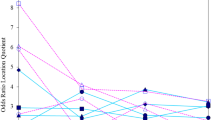Abstract
The sociology of music has been an area largely left to European sociologists. In an effort to generate greater domestic interest in the field, an examination of Max Weber's methodology and an update to his study of music is proposed. Fewer occupations or cultural projects are more social than making music, and the domestic sociological community's absence from the debate is deplorable given the dominant position our country possesses regarding musical production. Weber's Sociology of Music, which combines urban theory, class/labor theory, rationalization theory, and even climatic changes, is an excellent place to begin a thorough discussion of the social components of music. Our present understanding of cultural theories, urban theories, and Habermas's Communicative Action Theory can be employed to improve on Weber's theory; toward a new approach for the study of the sociology of music.
Similar content being viewed by others
REFERENCES
Adorno, Theodor 1945a What National Socialism has Done to the Arts. Frankfurt, Germany: University of Frankfurt.
1945b The Climate for Fascism in Germany. Frankfurt, Germany: University of Frankfurt.
1962 Introduction to the Sociology of Music. New York: Seabury Press.
Apel, William, and Ralph Daniel 1960 The Harvard Brief Dictionary of Music. Cambridge, MA: Harvard University Press.
Becker, Howard 1971 Culture and Civility in San Francisco. San Francisco, CA: Transaction Press.
Beetham, David 1985 MaxWeber and the Theory of Modern Politics. New York: Polity Press.
Blau, Judith 1989 The Shape of Culture. New York: Cambridge University Press.
Bourdieu, Pierre 1984 Distinction: A Social Critique of the Judgment of Taste (R. Nice, Trans.). Cambridge, NY: Harvard University Press.
Chalcraft, David 1993 “Weber, Wagner and thoughts of death.” Sociology 27(August):443-449.
Eisenstadt, Schmuel 1992 “Culture, Religions and development in North American and Latin American civilizations.” International Social Science Journal 44:593.
Finnegan, Ruth 1989 The Hidden Musicians. Cambridge, England: Cambridge University Press.
Frith, Simon 1989 Art Into Pop. London: Routledge Press.
Gerth, Hans, and C. Wright Mills 1948 From Max Weber—Essays in Sociology. Gerth and Mills London: Oxford Press.
Gilmore, Samuel 1990 Art Worlds: Developing the Interactionist Approach to Social Organization. University of Chicago Press: Chicago, IL.
Habermas, Jurgen 1988 Theory of Communicative Action: Vol. 2. Life World and System (T. McCarthy, Trans.). Boston, MA: Beacon Press.
Hasse, John 1985 Ragtime. New York: MacMillan Press.
Jameson, Frederick 1990 Late Marxism: Adorno or the Persistence of the Dialectic. London: Verso Press.
Kasler, Dirk 1988 Max Weber: An Introduction To His Life And Work (Philippa Hurd, Trans.). New York: Polity Press.
Martin, Peter 1995 Sounds and Society: Themes in the Sociology of Music. Manchester, England: Manchester University Press.
Nettl, Bruno 1985 The Western Impact on World Music. New York: Schirmer Books.
Robinson, Deanna, Elizabeth Buck, and Marlene Cuthbert 1991 Music at the Margins: Popular Music and Global Diversity. Newbury Park, CA: Sage.
Salmen, Walter 1983 The Social Status of the Professional Musician from the Middle Ages to the 19th Century. New York: Pendragon.
Schweder, Richard 1991 Thinking Through Cultures Expeditions in Cultural Psychology. Cambridge, MA: Harvard University.
Shank, Barry 1991 Identity, Community and Post-Modernity: The Rock-N-Roll Scene in Austin, TX. Ann Arbor, MI: UMI Dissertation Services.
Shepherd, John 1993 “Value and power in music: An english canadian perspective.” In V. Blundell, J. Shepherd, and I Taylor (eds.), Relocating Cultural Studies. London: Routledge.
Sjoberg, Gideon, and Leonard Cain 1971 “Negative values, counter-system models and the analysis of social systems” In H. Turk and R. Simpson (eds.), Institution and Social Exchange: 212-229. Indianapolis, IN: Bobbs-Merril.
Sjoberg, Gideon, and Kathryn Kuhn 1989 “Autobiography and organizations: Theoretical and methodological issues.” Journal of Applied Behavioral Science 25(4):309-326.
Straw, William 1991 “Systems of articulation, logics of change: Communities and scenes in popular music.” In W. Straw and J. Shepherd (eds.), The Music Industry in a Changing World. Special edition of Cultural Studies, 5(3): 368-388.
Turley, Alan 2000 Music in the City: A History of Austin Music. Austin, TX: Duckling Publishing.
Weber, Max 1904 The Protestant Ethic and the Spirit of Capitalism. New York: Scribner and Sons.
1921 Economy and Society. New York: Scribner and Sons.
Wicke, Peter 1990 Rock Music. Cambridge, England: Cambridge University Press.
Author information
Authors and Affiliations
Rights and permissions
About this article
Cite this article
Turley, A.C. Max Weber and the Sociology of Music. Sociological Forum 16, 633–653 (2001). https://doi.org/10.1023/A:1012833928688
Issue Date:
DOI: https://doi.org/10.1023/A:1012833928688




